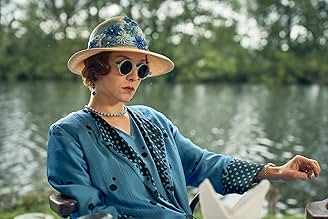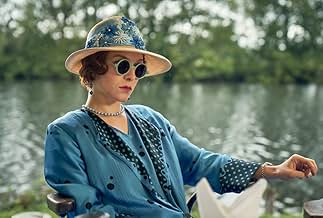VALUTAZIONE IMDb
6,1/10
5659
LA TUA VALUTAZIONE
Una domestica che vive nell'Inghilterra del primo Dopoguerra, pianifica segretamente riunirsi con l'uomo che ama prima che parta per sposare un'altra donna.Una domestica che vive nell'Inghilterra del primo Dopoguerra, pianifica segretamente riunirsi con l'uomo che ama prima che parta per sposare un'altra donna.Una domestica che vive nell'Inghilterra del primo Dopoguerra, pianifica segretamente riunirsi con l'uomo che ama prima che parta per sposare un'altra donna.
- Premi
- 2 candidature totali
Nathan Chester Reeve
- Dick
- (as Nathan Reeve)
Sope Dirisu
- Donald
- (as Sope Dìrísù)
Recensioni in evidenza
Eva Husson's first English-language film, 'Mothering Sunday,' is a lusty, deeply melancholy portrayal of loss and its lasting impact that often feels disjointed and uneven. It's pretty to look at with impressive performances (and sizzling chemisty) from Odessa Young and Josh O'Connor but, unfortunately, doesn't offer much else.
The scenery is incredible, as is the performances of Colin Firth and Olivia Colman.
The rest of the movie is incredibly disjointed, and because there is no actual emotion or feeling between the two main characters, Odessa Young and Josh O'Connor, it quickly became annoying. There is only so much cigarette smoking a person can watch before you realize, I suppose, this is the point where the viewer is supposed to be emotionally touched. The problem is, I wasn't. Ever.
This felt like going to a beautiful restaurant and waiting so long for your meal that by the time it's gets there you want to throw the plate on the floor.
Much of the movie is beyond belief, such as the maidservant (who, between the wars, works for the wealthy Niven family), wandering naked through a manor house, seemingly unconcerned that the owners may show up...for over an hour.
At every turn, I kept thinking, here it is, we must be getting to the point...but 'the point' simply never happened.
A waste of talent and scenery, however it is worth watching simply for the performances of Firth and Colman. They are outstanding.
The rest of the movie is incredibly disjointed, and because there is no actual emotion or feeling between the two main characters, Odessa Young and Josh O'Connor, it quickly became annoying. There is only so much cigarette smoking a person can watch before you realize, I suppose, this is the point where the viewer is supposed to be emotionally touched. The problem is, I wasn't. Ever.
This felt like going to a beautiful restaurant and waiting so long for your meal that by the time it's gets there you want to throw the plate on the floor.
Much of the movie is beyond belief, such as the maidservant (who, between the wars, works for the wealthy Niven family), wandering naked through a manor house, seemingly unconcerned that the owners may show up...for over an hour.
At every turn, I kept thinking, here it is, we must be getting to the point...but 'the point' simply never happened.
A waste of talent and scenery, however it is worth watching simply for the performances of Firth and Colman. They are outstanding.
I wanted to like this film but it strikes me as an empty book, an idea abut time but with no place to go.
Main story set in 1924 sees the country gentry still reeling from the slaughter of World War I Several families maintain the tradition of a picnic by the river on Mother's Day and recall the times when the children played and swam in the river. They're all dead now except for the youngest (Josh O'Connor), who's about to marry one of the daughters who was engaged to one of the boys now dead.
A maid in the house named Jane (Odessa Young), an orphan who's been "in service" since she was 14, is having a secret affair with the boy and meets with him one last time before he goes to the party to announce his engagement to the young woman.
The lady of the house (Olivia Colman) tells the maid she's lucky to have been an orphan. She can observe life without having to deal with the deaths of loved ones.
Jane eventually leaves the house and goes to work in a bookstore where she meets a philosopher and becomes his lover (there's talk of marriage). We also see Jane as an old woman (Glenda Jackson) who has indeed lived most of her life as an observer and as a famous writer.
Jane's life after she leaves the country house is sketchy and the viewer will likely feel cheated. We're not told very much ... yet the film runs for 104 minutes.
Jane strikes me as a character out of time and place. Would an uneducated house maid in 1924 be this self- possessed and confidant? Were interracial marriages possible in England in the 1930s and 40s? What kinds of books did Jane write? No details.
Young is good and O'Connor is better. Colman and Jackson combined have about 10 minutes of screen time. Colin Firth plays the "lord of the manor," but no one else registers.
There's a reference to Virginia Woolf's "Orando" and I guess that's meant to be a clue. Jane is a character out of time. Time is fluid and has no temporal barriers.
Main story set in 1924 sees the country gentry still reeling from the slaughter of World War I Several families maintain the tradition of a picnic by the river on Mother's Day and recall the times when the children played and swam in the river. They're all dead now except for the youngest (Josh O'Connor), who's about to marry one of the daughters who was engaged to one of the boys now dead.
A maid in the house named Jane (Odessa Young), an orphan who's been "in service" since she was 14, is having a secret affair with the boy and meets with him one last time before he goes to the party to announce his engagement to the young woman.
The lady of the house (Olivia Colman) tells the maid she's lucky to have been an orphan. She can observe life without having to deal with the deaths of loved ones.
Jane eventually leaves the house and goes to work in a bookstore where she meets a philosopher and becomes his lover (there's talk of marriage). We also see Jane as an old woman (Glenda Jackson) who has indeed lived most of her life as an observer and as a famous writer.
Jane's life after she leaves the country house is sketchy and the viewer will likely feel cheated. We're not told very much ... yet the film runs for 104 minutes.
Jane strikes me as a character out of time and place. Would an uneducated house maid in 1924 be this self- possessed and confidant? Were interracial marriages possible in England in the 1930s and 40s? What kinds of books did Jane write? No details.
Young is good and O'Connor is better. Colman and Jackson combined have about 10 minutes of screen time. Colin Firth plays the "lord of the manor," but no one else registers.
There's a reference to Virginia Woolf's "Orando" and I guess that's meant to be a clue. Jane is a character out of time. Time is fluid and has no temporal barriers.
It is soon after the First World War and three middle-aged couples gather for lunch on Mothers' Day to celebrate the engagement of Paul (Josh O'Connor), the only survivor of the couples' five sons, the rest of whom were killed during the war. But Paul is late to the lunch, because he is having a last tryst with Jane (Odessa Young), a maid employed by one of the couples, the Nivens (Colin Firth and Olivia Coleman). Running parallel to that story is one set some years later, when Jane is a published author and living with fellow writer Donald (Sope Dirisu), who is gentle and wise in the way sole black characters in this sort of production often are. And running parallel to *that* is a story set many *decades* later, in which Jane has grown into Glenda Jackson and reminisces about her two lovers.
Stories revolving around romantic relationships between the British rich 'upstairs' and their subordinates 'downstairs' are ten a penny - although Jane has more common sense than the usual waif and there was not quite as much nudity in the likes of 'Downton Abbey' as there is here! Many of the characters are two-dimensional - Firth does his uncomfortable upper-class schtick yet again and Coleman also seems to be 'phoning in her performance, at least until an emotional outburst makes the viewer realise there is, after all, some life to Mrs Niven. The constant back-and-forth between the various time periods could have been confusing but director Eva Husson manages to give each one a distinctive tone.
On the whole, an enjoyable film that manages to be comforting because of its predictability.
Stories revolving around romantic relationships between the British rich 'upstairs' and their subordinates 'downstairs' are ten a penny - although Jane has more common sense than the usual waif and there was not quite as much nudity in the likes of 'Downton Abbey' as there is here! Many of the characters are two-dimensional - Firth does his uncomfortable upper-class schtick yet again and Coleman also seems to be 'phoning in her performance, at least until an emotional outburst makes the viewer realise there is, after all, some life to Mrs Niven. The constant back-and-forth between the various time periods could have been confusing but director Eva Husson manages to give each one a distinctive tone.
On the whole, an enjoyable film that manages to be comforting because of its predictability.
Mothering Sunday. A lot of work has gone into this film in terms of congregating a good cast including a Olivia Coleman & Colin Firth. Some good acting and lovely cinematography, but unfortunately it was very, very slow. Trying to create an enigmatic and sultry atmosphere for a romantic love story but it just didn't come off.
The penny dropped that all the good romantic films watched in the past you 'bought in' to the characters and felt for them, urging them to succeed. Here I found we got to a point after 30 minutes where we couldn't care less about the two lovers or what happened to them. We weren't moved or brought to tears but felt complete apathy. Plus it was like an advert for cigarettes with so many smoked!
The penny dropped that all the good romantic films watched in the past you 'bought in' to the characters and felt for them, urging them to succeed. Here I found we got to a point after 30 minutes where we couldn't care less about the two lovers or what happened to them. We weren't moved or brought to tears but felt complete apathy. Plus it was like an advert for cigarettes with so many smoked!
Lo sapevi?
- QuizThe film marks the first appearance of Academy Award winner Glenda Jackson in a theatrical release in over 30 years, having last appeared in King of the Wind (1989), as well as the penultimate film role of her lifetime.
- BlooperIn the cycling scenes it is obvious that it is late summer or early autumn (long grass, mature green and yellow leaves on the trees etc) while the plot is set around Mothering Sunday in spring.
- Citazioni
Samuel: You looked like you're about to... do an Ophelia.
Emma Hobday: Are you allowed to speak to me like that?
Samuel: Like what? Like I have read Shakespeare?
- ConnessioniFeatured in Projector: Mothering Sunday (2022)
- Colonne sonoreWe Plough the fields, and scatter
(uncredited)
Lyrics by Matthias Claudius, translated by Jane M. Campbell
Music attributed to Johann A.P. Schulz
Recited by Odessa Young and Josh O'Connor
I più visti
Accedi per valutare e creare un elenco di titoli salvati per ottenere consigli personalizzati
- How long is Mothering Sunday?Powered by Alexa
Dettagli
- Data di uscita
- Paesi di origine
- Siti ufficiali
- Lingua
- Celebre anche come
- Amores Prohibidos
- Luoghi delle riprese
- Aziende produttrici
- Vedi altri crediti dell’azienda su IMDbPro
Botteghino
- Lordo Stati Uniti e Canada
- 275.352 USD
- Fine settimana di apertura Stati Uniti e Canada
- 9322 USD
- 27 mar 2022
- Lordo in tutto il mondo
- 2.260.859 USD
- Tempo di esecuzione1 ora 44 minuti
- Colore
- Proporzioni
- 1.66 : 1
Contribuisci a questa pagina
Suggerisci una modifica o aggiungi i contenuti mancanti










































